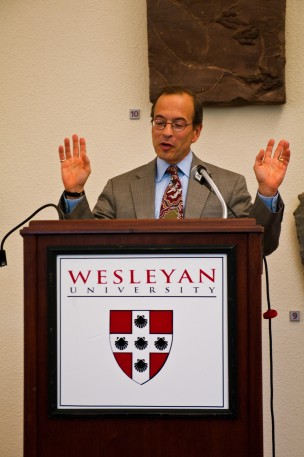
Dat Vu/Staff Photographer
On Wednesday, Sept. 19, Chief Magistrate Judge of the United States District Court for the Eastern District of New York (EDNY) Steven Gold ’77 P’09 gave a talk in the Exley Science Library Study Lounge entitled “Imposing Sentence: The Balance Between Affording Discretion and Avoiding Disparity.” The talk addressed the current changes in legislation regarding judges’ control over sentencing. Those in attendance included Judge Gold’s University classmates and former professors, as well as a number of current students.
As an alumnus, Gold related his topic back to the University and its students.
“I was on Foss Hill in a business suit for the first time today,” Gold said as the room erupted with laughter.
The issue at hand was how much say the legislative branch should have in the sentencing of criminal trials and how much creativity judges should be allowed when devising punishments. Judge Gold’s speech focused on criminal cases involving the distribution of controlled substances, or cases relating to Title 21 Section 841 of the United States Code Controlled Substances Act. In these cases, defendants may be subject to punishments ranging from parole to 20 years in prison. A randomly appointed judge would decide the severity of sentencing in such cases.
Gold went on to describe his first day as an Assistant United States District Attorney for EDNY. He was appointed to assist on two almost identical Section 841 cases, each of which had a different judge.
“There was little if anything to distinguish one from the other, except for the judges presiding over their cases,” Gold said. “In the morning, the first offender was sentenced to prison for 18 months by one of the more lenient sentencers on our bench. In the afternoon, I had an almost identical case with one of the harsher sentencers on our branch, and the defendant was sent to prison for 8 years.”
Discrepancies like this one had a great impact on judges like Gold, because those judges were held solely responsible for the outcomes of these cases.
“I left the courthouse that day upset,” Gold said. “I was upset by the disparity in these sentences.”
Experiences like his led to the creation of sentencing guidelines in 1984, a set of rules telling judges which crimes merit which specific punishments. These restraints placed on the judiciary branch by Congress were beneficial in that similar cases were awarded similar punishments.
“With the guidelines in place, no longer would a defendant’s sentence depend upon the judge randomly assigned to the case,” Gold said. “Rather, judges would be obligated to set a sentence within a narrow range of months calculated based upon the gravity of the offense and the criminal history of the offender.”
However, sentencing guidelines prevented judges from looking at the specific circumstances of each case and applying them to the sentence. The guidelines took away sentencing judges’ power to be creative in their punishments and in fact ended up raising the average length of imprisonment.
Gold seemed to be both for and against these sentencing guidelines, and he expressed satisfaction when he explained that in 2005 the guidelines were converted from mandatory rules into mere suggestions. Currently, judges use the guidelines as much or as little as they like. The guidelines exist only as suggestions and are extremely useful in providing a more specific framework regarding which crimes fit which punishments.
Gold brought many books and articles relating to his lecture topic with him and encouraged listeners to peruse them during the reception, following his talk. After the speech, several students and teachers stayed to speak with him.
“I thought the talk was of unusually high intellectual quality, and I was very proud to have been the speaker’s teacher and friend,” said Professor of Economics Richard Adelstein.
Adelstein had written a scholarly article on this exact topic when Gold was his research assistant, and Gold cited him as the main reason he became interested in criminal law.
Some of the students who attended the talk said that they agreed with the position that Gold took in his talk.
“I was impressed by the breadth of his speech, and I think the reform that he sees on the horizon needs to come,” Shane Donahue ’14 said. “I just hope it comes soon.”
Other students in attendance also said they were glad they heard Gold’s speech.
“It was a very enriching opportunity, ” said Casey Downey ’16.
Also present at the speech were University Librarian Pat Tully and Assistant Librarian Jennifer Hadley, both of whom are part of the “Friends of the Library” program. Tully said that there was value in discussing how judges approach their decisions.
“It’s interesting to hear how judges really grapple with the law… and to hear a critical view of the justice system,” Tully said.
Hadley encouraged students to come to the next Constitution Day speech and to participate in similar events in the future.
“These talks are a great opportunity for intellectual dialogue among alumni, students, faculty, staff, and community members,” Hadley said.
-
Max
-
RobinH ’62